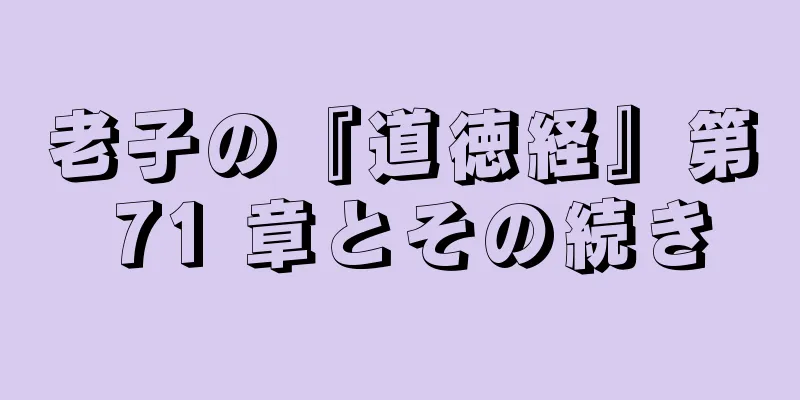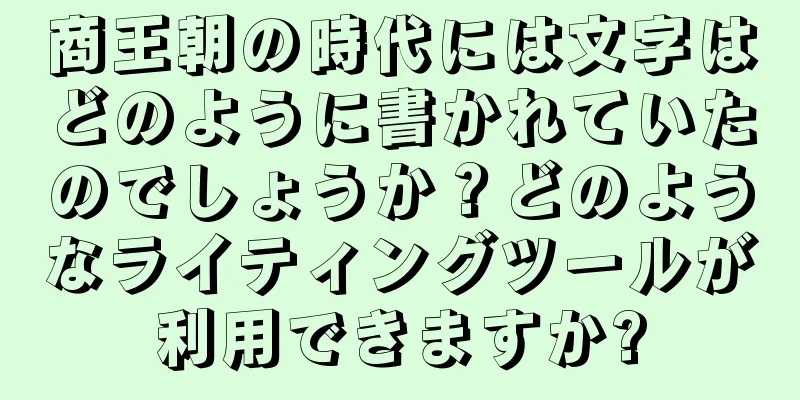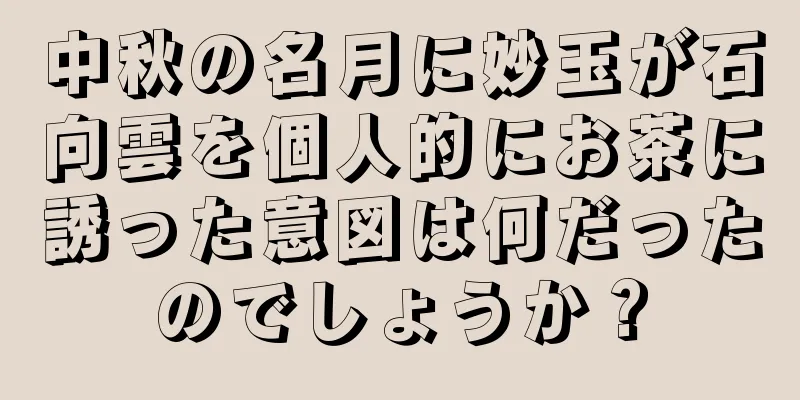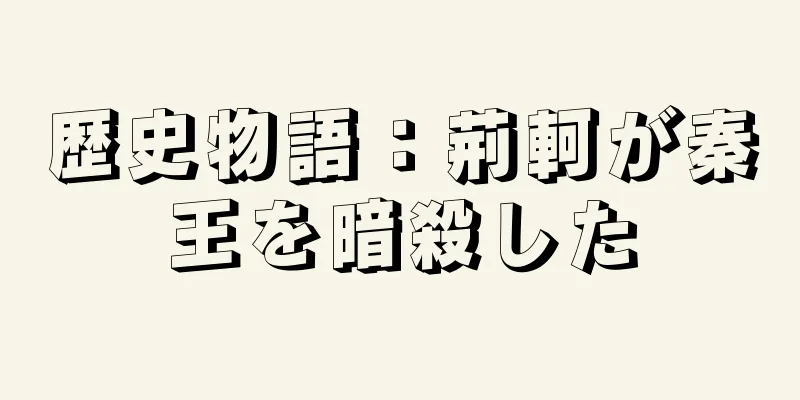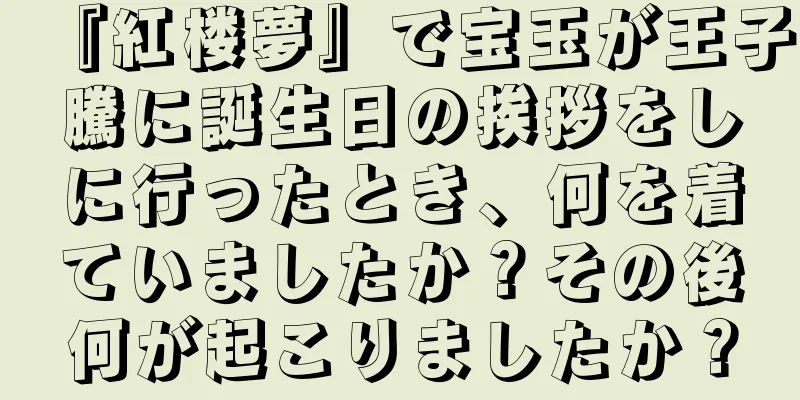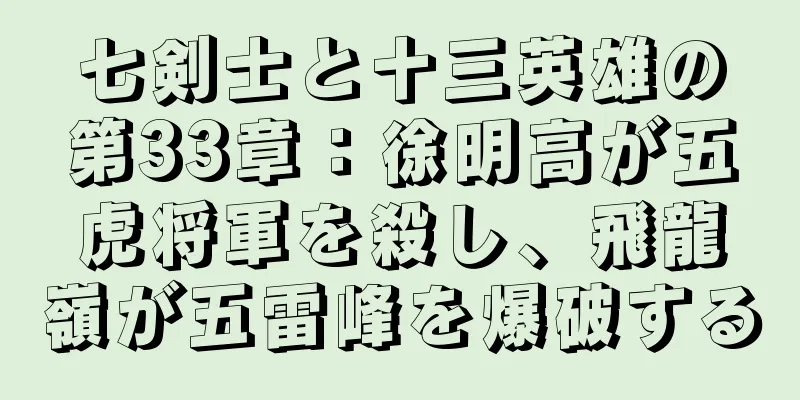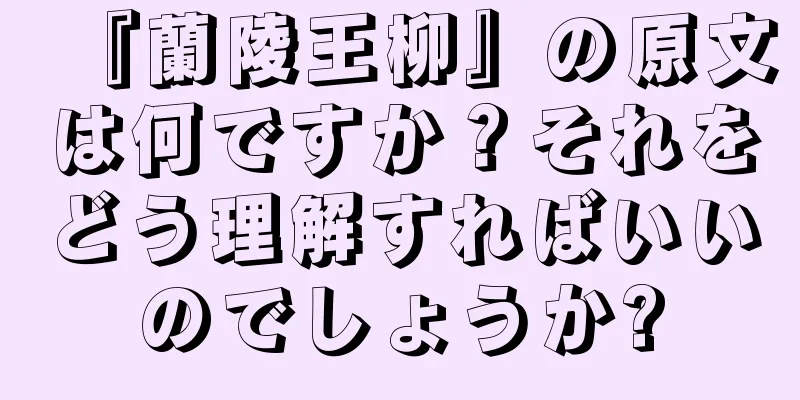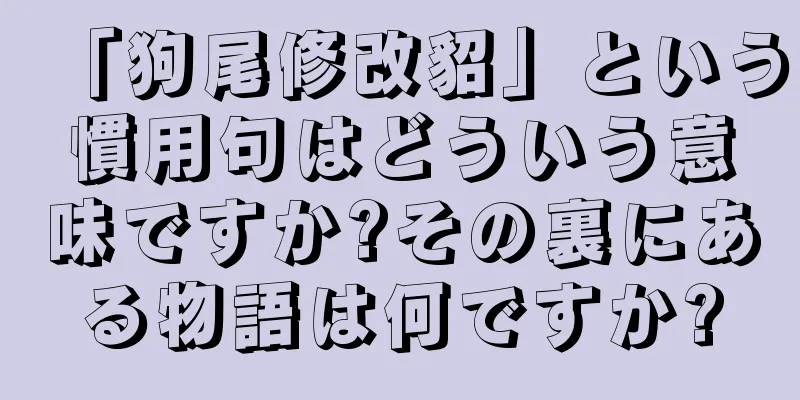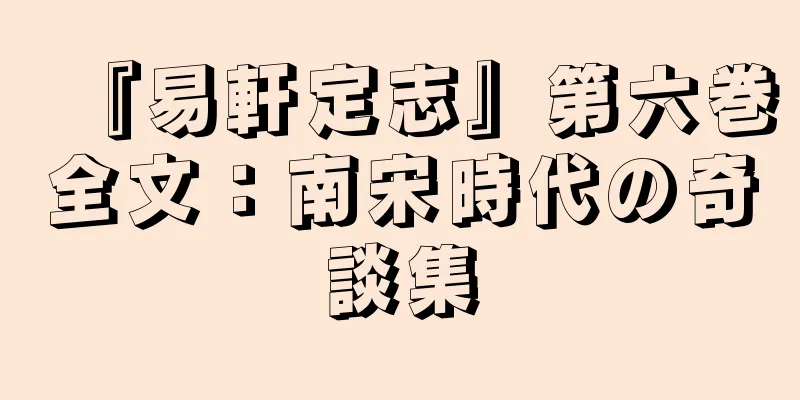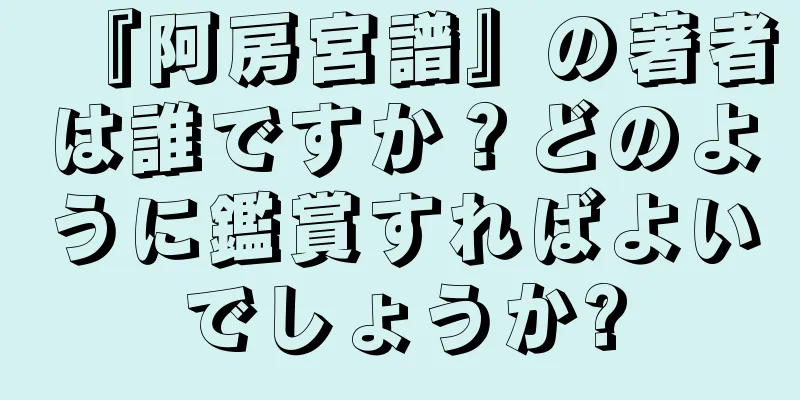秦以前の学問書『管子奎度』は何を表現しているのでしょうか?
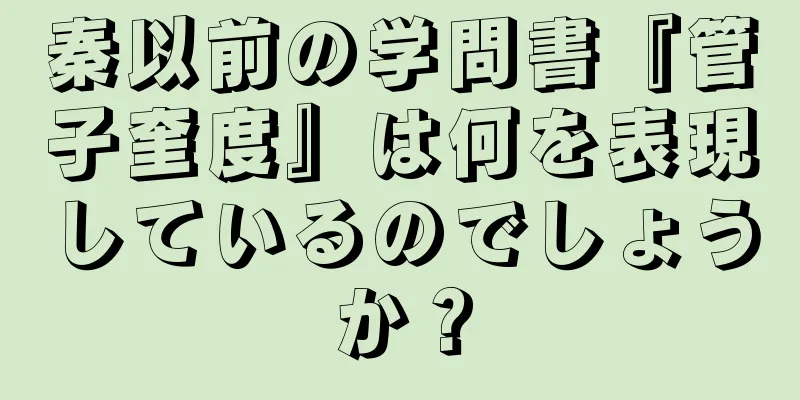
|
秦以前の学術書『管子』に書かれた思想は、当時の政治家が国を治め、世界を平定するために用いた偉大な原則と方法でした。では、「関子奎度」の章に書かれている真実とは何でしょうか?次の興味深い歴史編集者が詳しく紹介しますので、読み続けてください〜 斉の桓公は管子に尋ねた。「水仁の時代以来、何か大集会があったと聞いたがどうか」。管子は答えた。「水仁の時代以来、天下の重んじることを考慮しなかった国は一つもない。公公の時代、国の七割は水で、三割は陸で占められていました。彼は自然環境を利用して天下を治めました。黄帝の時代、彼は敵の爪や歯から逃れ、道具を使わず、山林を焼き、沼地を破壊し、沐沢を焼き、獣を追い払い、民に利益をもたらしました。そうして初めて天下を治めることができました。堯と舜の時代、彼らは北方の于氏を利用して国を改造しました。南の玉は揚子江や漢江の真珠のように貴重である。獣の敵を倒すために、官吏はそれに従う。桓公は「どういう意味ですか」と尋ねると、管子は答えた。「命令は『人質になる王子の息子には、すべて双甲の鷲の皮を与え、大臣にはヒョウの飾りを付け、官吏にはヒョウの帽子を与える』というものである。官吏は町の穀物やその他の財産を分配して、虎やヒョウの皮を買う。そのため、山林の人々は、親戚の敵を追うかのように、猛獣を刺す。この王は宮中では冠をかぶり、服を着ているが、外では凶暴で無礼である。官吏はすでに財産を分配しており、1万人が彼に従うことができる。これは堯と舜の数である。」 Duke Huan asked, "'If things are named two, and the world is governed by the correct names of five', what does 'name things two' mean?" He replied, "The heavenly strategy is yang, and the earth's strategy is yin. This is called 'name things two'." "What is called 'correct names five'?" He replied, "It is the balance, the compass, the square, and the standard. This is called 'correct names five'. In terms of color, it is blue, yellow, white, black, and red; in terms of sound, it is gong, shang, yu, zhi, and jiao; in terms of taste, it is sour, spicy, salty, bitter, and sweet. The two and five are barren mountains and dry lakes. A ruler controls people with numbers. Taste is to protect the people's mouths, sound is to protect the people's ears, and color is to protect the people's eyes. If a ruler loses the two and five, his country will be destroyed, if an official loses the two and five, his power will be destroyed, and if a citizen loses the two and five, his family will be destroyed. This is the key to a country, and it is called the key to a country." 厳しさの法則は、「司馬になれると言っているのに司馬になれない者は、太鼓の挑発として殺される。土地を経営できると言っているのに土地を経営できない者は、神社の挑発として殺される。官吏になれると言っているのに官吏になれない者は、門父として鼻を切られる」というものである。したがって、誰も姦通を犯して君主に給料を偽って請求する勇気はなかった。そのため、任寅首相の在任中は、扉を固く閉ざし、太鼓を鳴らしても外出できず、法律に基づいて処罰された。 Duke Huan asked Guanzi, "Please tell me about the great standard." Guanzi replied, "The great standard means that all the people in the world are controlling me and I am not part of it. This is called the great standard." Duke Huan asked, "What does it mean?" Guanzi replied, "Today, the world has risen up against me. Those ministers who can make plans to strengthen the country and establish its reputation will be given land and fiefs; those ministers who can use chariots and soldiers to advance and retreat successfully and establish their reputation will be given land and fiefs. In this way, all the people in the world are fiefdoms for the monarch's ministers, not the monarch himself. The world has already fiefdoms for the monarch's ministers of ten li. Whenever the world is in turmoil, the monarch's people are re-fiefdoms of twenty li. The monarch's people are not rich, but the neighboring countries are rich. Whenever the neighboring countries are in turmoil, they re-enrich the monarch's people. The poor become poorer and the rich become richer. This is the wrong number." Duke Huan He asked, "What do you mean?" Guanzi replied, "Today, the whole world has risen up to attack us, and the people have abandoned their hoes and plows and gone out with weapons. Therefore, the country cannot cultivate. This is not a disaster from heaven, but a disaster from people. The king issues orders in the morning and asks for supplies in the evening. The people spend their money and property to fight with their grains, and leave in disgust. The merchants accept the money and provide them with food. Then one-third of the country's wealth is in the hands of the merchants. When the army is over, the people return to their work, and all things return to their weight. The merchants give their money and property, and a small part of the country's currency is used to provide food for the merchants. In this case, the currency is three-tenths heavier, and the weight of the property is three-tenths heavier. The merchants trade between three-tenths, and the country's wealth is all in the hands of the merchants, and the king has no strategy. The people control each other, and the king has no problem. This is the great standard of weight." 管子は言った。「君主が根を制すれば、民は終わりを制することはできない。君主が初めを制すれば、民は終わりを制することはできない。道にいる者は、辻に記録すべきであり、谷にいる者は、春秋に守るべきであり、万物にいる者は、立てて動かすべきである。したがって、物事が動くと、それらは反応する。したがって、君主が先に道を制すれば、民は従わず、君主が流れを制すれば、民は高さを失う。したがって、四方の高低を維持すれば、国に放浪商人は存在せず、貴人と賤人が平等になる。これを国の均衡といい、利益をもって互いに守り合えば、数は君主に返る。」 Guanzi said: "Those who are good at regulating the business will reduce the number of shops. When the shops are reduced, the market will be quiet. When the market is quiet, the fields will be plentiful. When the fields are plentiful, the people will have enough wealth. When the people have enough wealth, the king will be able to collect taxes without limit. But it is not so now. The people are important and the king is important. They are important but cannot be trivial. The people are trivial and the king is trivial. They are trivial but cannot be important. The good people in the world are not like this. When the people are important, the king is trivial. When the people are trivial, the king is important. This is the number of surplus wealth to fill the shortage. Therefore, those who cannot adjust the interests of the people cannot be great. Those who do not observe the beginning and the end cannot be perfect. To move the left and right to follow the heavy is the policy of twenty countries; the salt and iron is the policy of twenty countries; the Sikkim is the policy of twenty countries. The number of the five government offices is not counted by the people." 桓公は管子に「重石や荷役の数は、どうすれば尽きるだろうか」と尋ねた。管子は答えた。「それは四季の巡りのように終わりがない。国が困ったときは五穀を量って秤にかけ、余った分は恩賞に使う。天下は従順で、国中は誠実で仁義に富んでいる。そのため民は高潔で慎み深く、変なことをしない。君主は重石や荷役に不満があれば戦争をするが、君主は従順で仁義を実践する。」 管子は言った。「農耕一年、食糧五年、粟の値段五倍。農耕一年、食糧六年、粟の値段六倍。農耕二年、食糧十一年。富める者から奪い貧しき者に与えることができれば、天下を治めることができる。また、天下はこのように治めるべきであり、このように治めれば、天下は統一できる。天下は、何に使われるかによって治められ、何に使われないかによって治められない。したがって、天下を治めるのに長けた者は、「使う」とは言わず、必要なときに使う。「使う」とは言わず、必要なときに使う。」 管子は言った。「良い君主は金属や石を持ち上げるようなものです。重すぎると金属は落ちてしまいます。したがって、力が強ければ力も強くなり、道が弱ければ力も弱くなります。今、穀物は私たちの国にとって世界の他の国々よりも重要なので、君主は川を流れる水のようにそれを流します。したがって、重いものは来て、軽いものは去ります。重いものを持って来ても軽い人がいれば、私たちはそれを動かして変えることができ、そうすれば世界は私たちのものになります。物は保管されているときは重く、放出されると軽く、散らばると重くなります。通貨が重ければ、人々はそれのために死に、通貨が軽いので、重さは数に応じて調整され、止まります。」 「五穀は民の生命線、刀銭は溝、命令は速さである。『命令は宝物よりも重要、国の祭壇は親族よりも重要』とはどういう意味か?」と彼は答えた。「城壁が落とされれば、国の祭壇は養われず、生きている大臣もいなくなるでしょう。親が死んだら、死んだ子供はいない。これは国が親戚よりも大切にしていることです。したがって、人がいない都市は平地を守る都市と呼ばれ、人はいるが武器も防具もなく食料もない都市は災難と共に生きる都市と呼ばれる。 ” 桓公は管子に尋ねた。「この国には七種類の玉貨があると聞きました。聞いてもいいですか?」管子は答えた。「陰山の玉は一種類の金です。燕の紫山の白金も一種類の金です。法と朝鮮の皮も一種類の金です。汝と漢水の幽曲の金も一種類の金です。江陽の真珠も一種類の金です。秦明山の青石も一種類の金です。玉石の辺境の山の玉も一種類の金です。これを少を多とし、狭を広とするといいます。天下の数は重さで決まります。」 Duke Huan asked Guanzi, "There are a thousand chariots with harnesses in the Yinshan Mountains. The average price of horses is ten thousand, and the average price of gold is ten thousand. I have a thousand pounds of hidden gold. What should I do?" Guanzi replied, "Please ask those who are in charge of the official registration to return the gold with money. I can get forty thousand, and this is one is four. I am not molding clay and shaking the furnace to stand gold. Now the weight of gold is one is four, which is a number. Pearls start from the end of the light in the red field, gold starts from the right channel of the Ru and Han rivers, and jade starts from the border mountains of Yushi. This is 7,800 li away from Zhou. The road is far and the destination is difficult. Therefore, the ancient kings used the weight and made pearls and jade as the upper currency, gold as the middle currency, and knives and cloth as the lower currency. The ancient kings raised the middle currency to the lower and the upper currency to benefit the lower and the upper." 百台の戦車がある国では、中央に東西南北に 50 マイルの長さの市場があります。計画に1日、準備に2日、完了に3日、そして戻るのに5日。重さの異なる戦車100台の訓練には5日以上はかからないでしょう。百台の戦車は、耕作地一万ヘクタール、一万世帯、十万人の人々、一万人の兵士、百台の軽戦車、四百頭の馬を意味します。千台の戦車があるこの国には、中央に市場があり、東西南北に150マイル以上もの長さがあります。計画を立てるのに2日、準備に3日、出発に5日、そして帰るのに10日。千台の戦車の重量は10日を超えてはなりません。千台の戦車は、10万ヘクタールの耕作地、10万世帯、100万人、分け前を与えられるべき10万人、軽戦車1,000台、馬4,000頭を意味します。 1 万台の戦車がある国では、中央に東西南北に 500 マイルの長さの市場があります。計画を立てるのに3日、準備に5日、出発に10日、そして帰るのに20日。一万台の戦車の重量は二十日を超えてはならない。一万台の戦車は、百万ヘクタールの耕作地、百万世帯、生計を立てることができる一千万人、富の分配を受ける権利のある一百万人、一万台の戦車、四万頭の馬を意味します。 Guanzi said: "A man is a widower, a woman is a widow, and an old man without children is a solitary. If the king asks if there are sons or daughters who died in the service of the teacher, the parents are alone, and the king must bury them: three layers of clothing and quilts, and the wood must be three inches long. The local officials will look after the burial and bury them in public land. If a child is born without brothers, the king will give them a piece of land for a horse. Therefore, it is not a hardship for parents to kill their sons to serve the king. The king travels around the towns and villages throughout the year. Those who have the same strength and beautiful houses are good children and hard workers. They should be given two bundles of dried meat and a stone of wine. Those who are strong enough to wander around and do not work, the old ones will be scolded, and the strong ones will be sent to the border. Those who have no foundation will be loaned to the strong. Therefore, all things are done, and there will be no people who are left with strength and time. This is the number of national policies." 上層農民は5つ、中層農民は4つ、下層農民は3つ保有しています。上衣が5着、中衣が4着、下衣が3着あります。農民には通常の職業があり、女性には通常の義務がある。農夫が土地を耕さなければ、人々は飢えに苦しむでしょう。女性が機織りをしなければ、人々は寒さに苦しむでしょう。飢え、寒さ、飢餓はすべて汚れから生じます。そのため、古代の王たちは、人々が利益のために子供を売ることがないよう、最初から注意深く、根本に注意を払いました。根は3つあり、まるで食べ物のようです。根のうち4本は村から提供される。五つの根が確立されれば、遠くの人も近くの人もつながり、死者も埋葬できるようになります。物事は元には戻らず、目上の要求は尽きることがないので、一人で悪の道に走ってはならないし、金銭も遠慮してはならない。法律を守れば、国の民は混乱し、罰は不均衡になる。米のない民は責任を問われず、売られた息子は召使として使えない。君主は民を失い、父親は息子を失う。これが国の運命だ。 管子は言った。「神農の数字にはこうある。『一粒が枯れたら一粒減らせば、穀物の歩みは十倍になる。二粒が枯れたら二粒減らせば、穀物の歩みは十倍になる。』夷狄は満腹で、食糧のない者はモロコシを与え、種子のない者は新しい作物を貸与される。したがって、収穫が十倍になる商売はなく、収穫が二倍になる人もいない。」 |
<<: 秦以前の学術書『管子善志書』とはどういう意味ですか?
>>: 『紅楼夢』で、元春が両親に会いに帰省したとき、なぜ三度泣いたのですか?
推薦する
『紅楼夢』で、林家の全財産が賈家によって横領されたというのは本当ですか?
蘇州林家は、賈、王、石、薛の四大家のほかに、『紅楼夢』で無視できないもう一つの家系である。 Inte...
剣士甘江と莫野のカップルの情熱的な物語の詳細説明
古代中国には恋愛物語が尽きることはありません。天地をめぐる「七仙物語」、慈悲深い「良珠の蝶化物語」、...
『中国のスタジオからの奇妙な物語 - 青梅編』の原文は何ですか?どのように理解すればいいのでしょうか?
「中国のスタジオからの奇妙な物語」からの「緑の梅」の原文白夏の程勝[1]は、いかなる境界にも従わない...
古代における「靴」の名前は何でしたか?古代から現代まで、靴はどのように進化してきたのでしょうか?
古代から現代まで、靴はどのように進化してきたのか?Interesting History編集部が、関...
なぜ賈おばあさんは、甄家の財産を没収するという困難に直面したとき、あんなに奇妙な反応をしたのでしょうか?
『紅楼夢』の賈婆さんは年老いていて、いろいろなことを経験してきました。それでは、なぜ甄家の財産が没収...
三英雄五勇士第33章:真の学者が白玉堂と初めて出会い、美しい英雄が顔茶三を3回試す
清朝の貴族の弟子、石宇坤が書いた『三勇五勇士』は、中国古典文学における長編騎士道小説である。中国武侠...
「彭公の場合」第253章:良い婿を選ぶ、孟紀は英雄を認め、誹謗中傷を信じ、清に閉じ込められる
『彭公安』は、譚孟道士が書いた清代末期の長編事件小説である。 「彭氏」とは、清朝の康熙帝の治世中の誠...
宮廷厩舎は馬を飼育する役割しか担っていなかったのに、なぜこの施設が明朝の皇帝の権力の柱とみなされたのでしょうか。
明代には24の内官があり、そのうち第一位に数えられたが、その印璽を保持する宦官は宮廷内で第一位の宦官...
『中南別業』の原文は何ですか?どのように鑑賞すればよいでしょうか?
中南ヴィラ王維(唐代)彼は中年期に道教に深い関心を持ち、晩年は南の山中に住んでいた。何かしたいときは...
王維の古詩「辞任した斉武書記を江東に送り返す」の本来の意味を理解する
古詩「辞職して江東に帰る書記の祁武を見送る」時代: 唐代著者 王維もし私が明朝にたどり着くことができ...
「Human Words」の著者は誰ですか?主な内容は何ですか?
『人言辞典』は清代末期の辞学に関する理論的著作である。作者:王国偉。 1908 年に初めて出版され、...
朱熹はどのような状況で『読書考』を書いたのでしょうか?人々に生涯を通じて一生懸命勉強し知識を求めるよう勧める
朱熹は、字を元慧、仲慧といい、慧安、慧翁とも呼ばれた。南宋時代の著名な儒学者、思想家、哲学者、詩人で...
魯粛の墓はどこにありますか?岳陽の魯粛の墓は本物ですか?
魯粛(読み方:子京)は、三国時代(172年 - 217年)の男性で、臨淮東城(現在の安徽省定遠の南東...
孫家の再興者として、この英雄孫堅はどのようにして財を築いたのでしょうか?
孫家の再興者としての孫堅の誕生は、おそらく良いものではなかったでしょう。これは3つの側面から説明でき...
キルギスの習慣: 荒々しくシンプルなキルギスのレスリング
レスリングは、ケ語では「謝力戲」と呼ばれます。これはキルギス人の古くからの非常に対戦的なスポーツであ...
